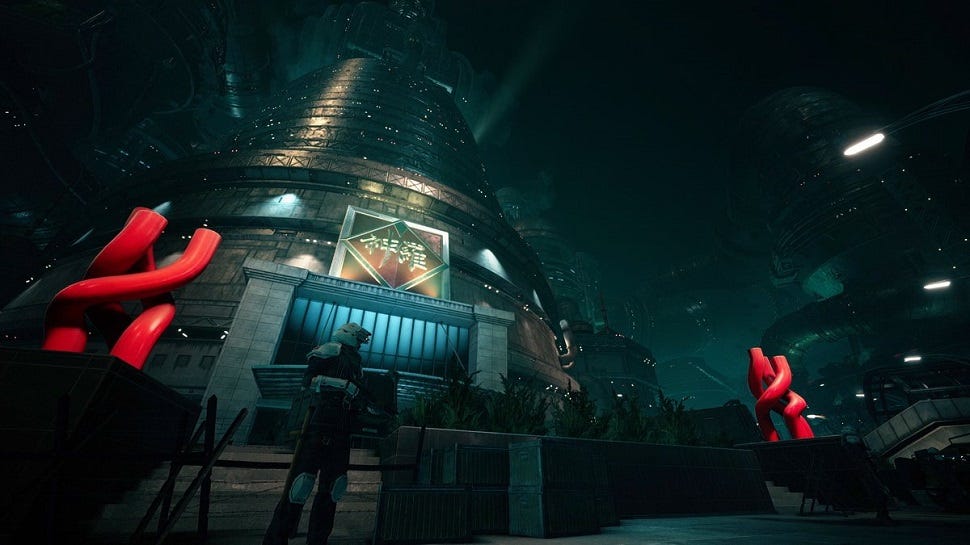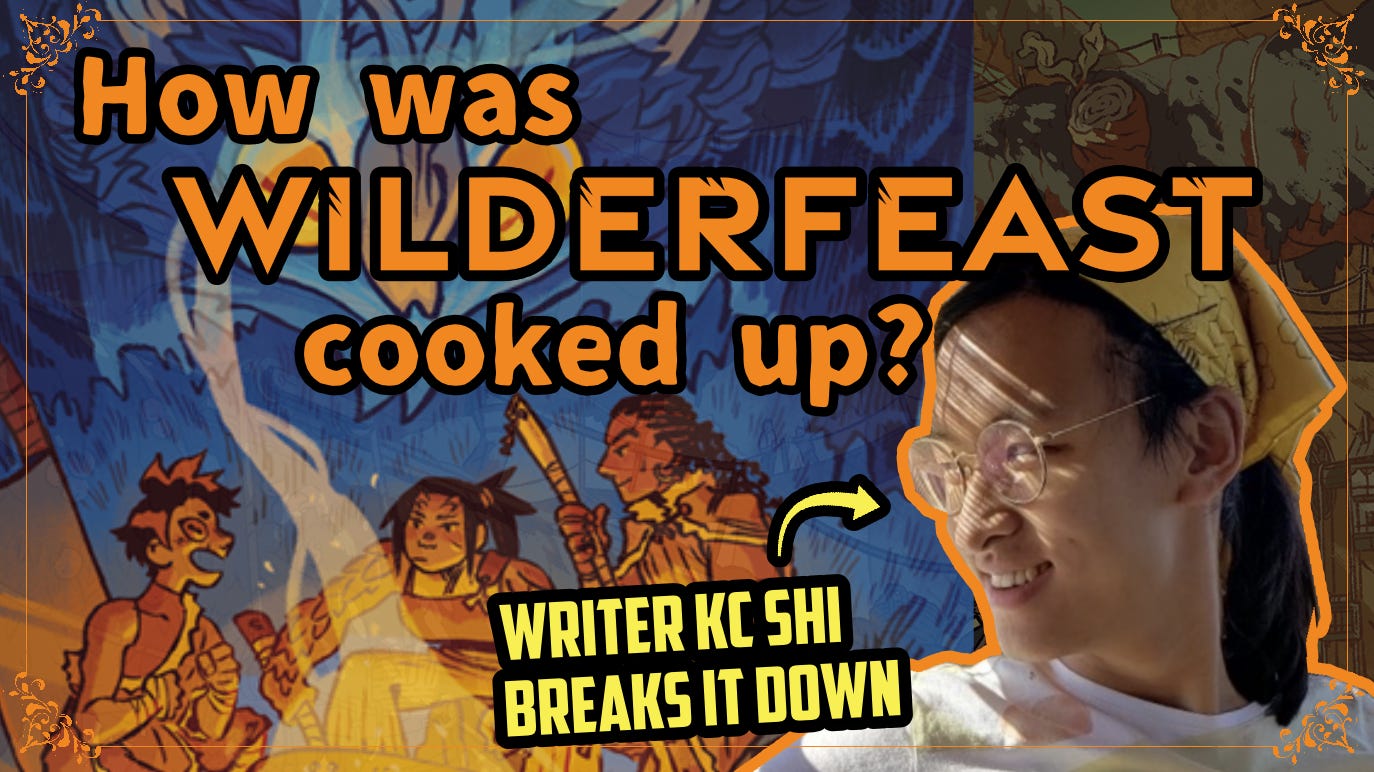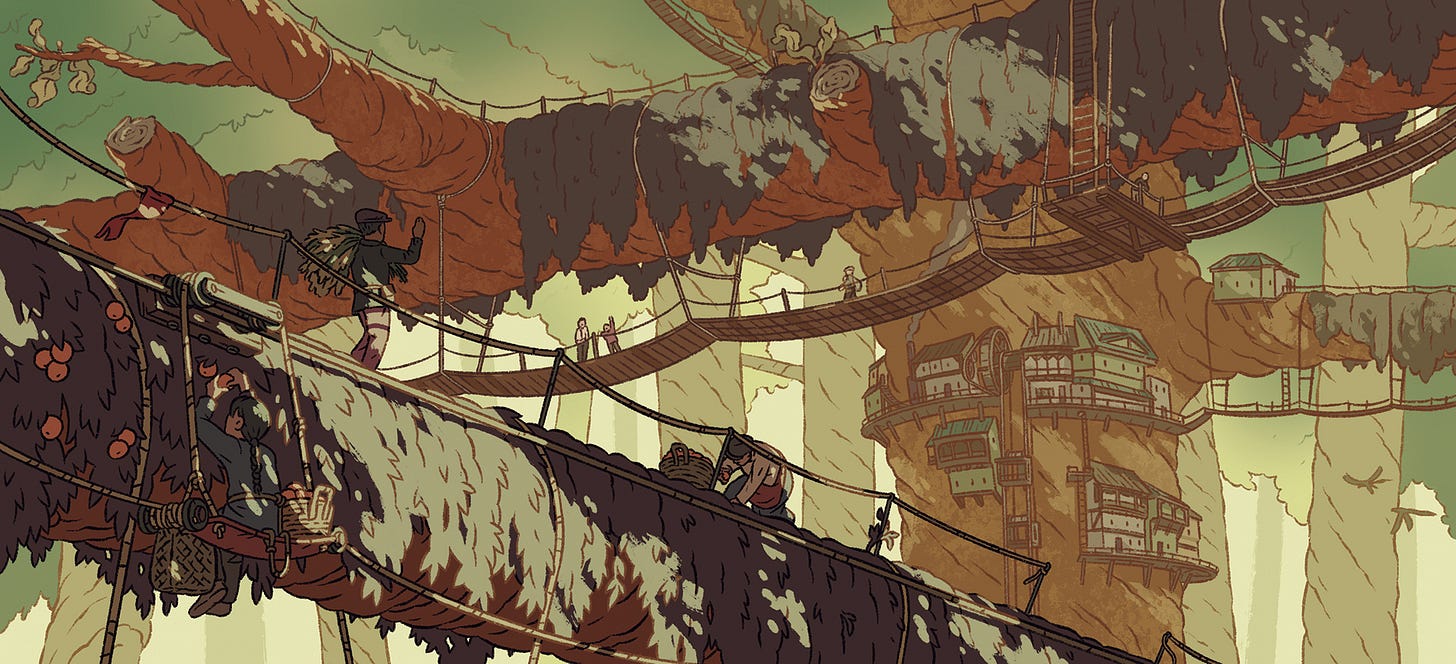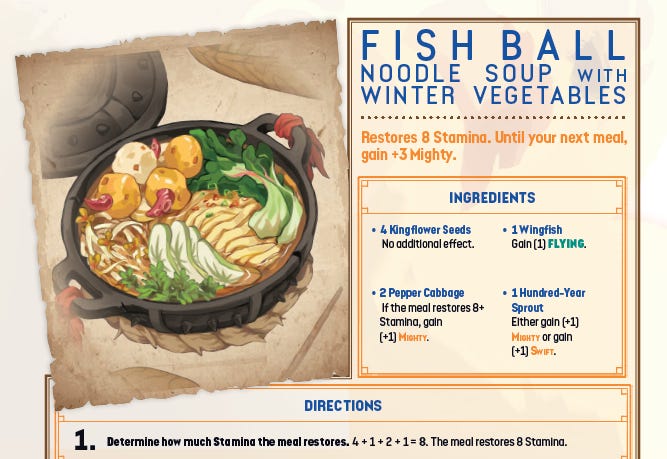How was Wilderfeast cooked up?
Writer KC Shi breaks down the ultimate fantasy cooking RPG! And Head of RPG at Horrible Guild, Signore Federico Corbetta, explains WHY Wilderfeast LOOKS so good
Wilderfeast is a fantasy culinary tabletop RPG crowdfunding on Kickstarter starting September 5, 2023. Here’s a link to the project.
Hi KC! Can you introduce yourself and tell us what kinds of games and projects you have worked on?
Hi Dave! I’m a writer and designer for TTRPGs. My previous projects include Warhammer Age of Sigmar: Soulbound, Broken Weave, BEOWULF: Age of Heroes, One More Quest, and anthologies like Uncaged on the DM’s Guild. I also used to work in voiceover production, where I helped with games like Destiny 2, Deathloop, and The Blackout Club.
That’s a lot of awesome right there. Can you describe what Wilderfeast is to those who haven’t heard anything about it yet?
Sure! Wilderfeast is an RPG about monster hunting and campfire cuisine. In Wilderfeast, you become part of the natural world by making it part of you. Players are “wilders” — monster hunters and chefs who wield gargantuan kitchen implements and gain powerful mutations from each monster they eat. Using those powers, they seek harmony between humanity and the wild. In this world, all creatures, be they humans or monsters, obey the One Law of the One Land: you are what you eat.
Where did the concept of Wilderfeast as a setting originally come from?
I can’t pick my answer, so I’ll give you the multiple choice version.
In 2008, Spore’s Creature Stage lodged an idea in my subconscious and it has remained there ever since.
During a time when I really struggled with body image and food, I watched the pure joy of my roommate’s cat eating his dinner and it was the most profound moment of inspiration in my life.
Charles Darwin got plenty right but he also got some things fantastically wrong. After learning about gemmules, I wondered about other alternative methods of inheritance and started worldbuilding an ecology where traits are transferred through food.
All of the above.
Basically, I’ve been fascinated with monsters and cooking for as long as I can remember. It’s hard to trace the concept back to any single source!
I’m getting flashbacks of SAT prep. Can we add an E) A and C only, and F) B and C only? But okay, those are some very interesting inspirations. Were there any media touchstones that you drew from? Have you read Dungeon Meshi by Ryoko Kui?
I adore Dungeon Meshi! It’s one of my all-time favorites. In terms of manga, Drifting Dragons by Taku Kuwabara also influenced Wilderfeast’s themes and atmosphere. And, of course, there’s Monster Hunter. I think it’s really important for TTRPGs to wear their inspirations on their sleeves, as so much of the fun relies on a shared understanding of the world and group storytelling.
(Honorable mention: Pikmin! It might not seem obvious at first glance, but the way the Pikmin series so elegantly captures all of nature’s paradoxes really resonates with me. If you’re a fan of the Piklopedia — for those who don’t know, it’s an in-world encyclopedia of all the game’s creatures, half-written by a thoughtful ecologist and half-written by a gourmand who’s obsessed with eating them — then I think you’ll enjoy the Wilderfeast bestiary.)
I can’t wait to see more of the unique world you created for Wilderfeast. There is a mention of a “global trading conglomerate” called The Charter, which is like an evil corporation responsible for spreading the Frenzy amongst monsters and getting away with it. In the full game will there be any interaction between PCs and The Charter, or will they remain a detail in the backdrop?
It all depends on the table! The Charter is this looming shadow over the world, so entrenched and omnipresent that it seems unassailable. It’s up to the players if they want to confront this vast organization or find a way to escape its influence.
For example, in my playtest campaign, there’s one wilder who dreams of a glorious, worldwide revolution that will topple the Charter in one fell swoop. But part of his journey is learning that this change starts at a local level. So he’s working to find others like him who oppose the Charter, all while he protects both the humans and the monsters the Charter has abandoned. There’s this balance between “I’m going to save the WORLD!” and “saving what’s in front of me is hard enough” that I really like — but my game is not your game, and I’m excited to see what other stories players will tell with the pieces we’ve given them.

The brief lore description and the artwork just in the quickstart for Wilderfeast are so evocative and original that one almost gets the sense that this game is based on an existing manga or anime. Do you feel the same way? Are there named characters within the world of Wilderfeast running around in your head?
Thank you, that’s very flattering! And I owe my gratitude and awe, as always, to the incredible artists who are bringing Wilderfeast to life. In terms of named characters, the playtest campaign I mentioned is full of figures I’ve cheekily made “canon.” For example, many of the Quickstart’s pregenerated characters are based off the PCs from this playtest campaign. Other named NPCs are scattered throughout the core book, with the aim of making the world feel rich, lived in, and connected.
One NPC I’m particularly fond of is the anonymous author of A Natural History of Monsters, the core book’s diegetic bestiary and guide to the world. Technically, she has a name, but she won’t tell you what it is. There are passages sprinkled throughout A Natural History of Monsters implying her backstory and relationships, which I found very indulgent and fun to write.
The mechanics for Wilderfeast might be what I call low-medium complexity, which is personally my sweet spot for RPGs. Briefly put, there is a d6 dice pool stemming from one of four core stats plus a skills modifier and a d8 or d20 results die. But there is also some depth, including things like Conditions, Monster Traits and Tool Techniques to mix things up. What were your inspirations for this unique, straightforward set of mechanics?
I steal a little from every RPG I read — my friends think I’m weird for this, but I like reading rulebooks cover to cover — and I steal a whole lot more from every RPG I play. Wilderfeast’s main mechanical inspiration is probably Blades in the Dark, particularly its dice pool system and the way its core loop evokes genre and theme.
I also really admire the depth of customization in Lancer, and I wanted to capture the same build-your-own feeling with mutations instead of mech parts.
Finally, I owe a lot to Cubicle 7’s Soulbound, which I spent a few years writing on and which laid the foundation for most of my skills as a TTRPG designer. You can see Soulbound’s influence in the freeform ways you can pair Styles and Skills together, the concept of Harmony (a positive spin on Soulbound’s Doom), the semi-classless character progression, and the streamlined pace of combat.

How much playtesting and iteration happened before you settled on the fact that the ONLY inventory that you track in the game (besides your one very special cooking utensil/fighting weapon) is your ingredients for cooking? That seems like such a stroke of genius in focusing the game’s theme while also reducing the tedium of tracking gear, but I assume that it didn’t start off that way.
It might surprise you to hear the answer is zero! From the start, the game’s focus was food and cooking. So the first iteration of inventory management in Wilderfeast reflected that focus, and it’s been that way ever since.
That IS a surprise. I guess that’s a feature of having lots of game writing and design experience. So how about the game phases? There is Free Play, The Trail (traveling), The Hunt (combat) and The Feast (post-hunt cooking and recovery). What was the evolution of the game like before you finally arrived at these phases?
Many RPGs have rules for travel and combat, but for Wilderfeast specifically, travel and combat serve two important functions: they give players time to understand the environment and the monster respectively. With this goal in mind, I arrived at The Trail and The Hunt early during the game’s design. During the initial days, the rules for cooking were scattered throughout the game, but I consolidated those under The Feast soon after the first playtests. As for free play, that is and always was the foundation these phases rested upon. This all happened before I even started working with Horrible Guild, so the overall structure of the game has been pretty stable since development began.
That being said, the rules within each phase have gone through more iterations than I can count. And there are probably more revisions coming in the future! I’m maybe too willing to scrap everything and start from scratch when I encounter a design problem, so there are versions of each phase that are totally unrecognizable. The places that needed improvement were especially glaring once people besides me started running the game, and I’m grateful for all their playtest feedback.
I was particularly struck with the psychological and almost spiritual elements of the game that you included in the Feast phase. On one hand, players have to sort out the ingredients they’re using and the benefits they’ll get from them, but then they have to answer a couple of questions like: “How is this meal connected to your past?” and “The next time you eat this meal, what will you remember?” What inspired you to include questions like these for players?
Cuisine is about context, be it personal, cultural, or environmental. For this game, I really wanted to create space for players to express that context. In a way, The Feast is why Wilderfeast is a tabletop RPG, as opposed to a board game or videogame. The medium enables conversations like this, and the questions are just there to provide structure and prompts. I first saw questions used as mechanics like this in Wanderhome, but “asking and answering” is so fundamental to how humans, like, talk that I don’t think you can really attribute it to a game. (Even a game as good as Wanderhome!)
There’s one more bit in the Feast phase that I thought was a nice touch: Giving Thanks. It reads “To signal you’re done asking questions and the meal is ready to eat, one wilder gives thanks. Think of this like saying grace or “itadakimasu (頂きます).” I really miss that about living in Japan, everyone saying “itadakimasu” before digging into a meal. Everyone said it, and it wasn’t necessarily religious, but it brought people together in a meal a little bit. Have you seen this in other games, where the game invites the players to invent rituals for a sort of culture of their own that ties them together?
Honestly, when it came to this, I took more inspiration from actual plays than the games themselves. “How do you want to do this?” is a good example of how a little phrase can signal victory, celebration, and relief to the whole table in less than five seconds. “Say hi, intrepid heroes!” is another one. It tells everyone that the game has begun with more punch than, “Um, OK, it’s a quarter past 5 so I guess we should start soon…”
The thing is, every table develops their own culture of running gags and references whether they’re broadcasting themselves to millions of people or not. It’s certainly happened plenty of times in my home games! The rules for giving thanks are just my way of encouraging that, and maybe directing that energy to a more thematic place for Wilderfeast specifically.
Plus, many languages have equivalents for itadakimasu or bon appétit, so it seemed natural to include. Sometimes I’m a little sad that giving thanks in English has such strong religious overtones. I think everyone should take time before a meal to acknowledge how it got there, regardless of their beliefs!
One silver lining from the global pandemic was that a lot of people got more into cooking at home, including myself. I now experience a lot of joy (and genuine deliciousness) after focusing on improving my cooking skills. Wilderfeast is incredibly focused on the social and even spiritual aspects of cooking. What has your relationship with cooking been like leading up to the creation of this game?
That’s great to hear! I’d love to know some of those delicious recipes you’ve been cooking.
For a long time, I had a bad relationship with food. I skipped a lot of meals as a kid because I didn’t like how my body looked, and then as an adult there was a time where I tried to scrimp and save every penny I could by skipping meals or eating cheap garbage.
That changed when I got it into my head that I couldn’t work if I was hungry. People talk a lot about how beautiful and healing food is, but frankly, it’s also just necessary. Once I was eating regularly again, that was when cooking really opened up to me. I started reading cookbooks, experimenting with new recipes, and hosting meals for friends. I especially love cooking with my partner. There’s something dance-like about people moving together around a kitchen they know well.
Wilderfeast is an expression of all those feelings: the joy and love, but also a bit of the guilt and resentment too. Cooking is a big, complicated topic, and I hope this game gives players space to explore their own relationships with it.
I suppose there is an element of the game that might give some pause, with regards to characters hunting animals and eating them. I noticed a few places in the quickstart that soften the blow on this topic, but how would you defend this game against people who might have a knee jerk reaction against PCs eating meat from animals they’ve killed?
I think the first thing I’d say is, “No worries, you don’t have to play!” Not every game is for everyone. That being said, Wilderfeast is deeply concerned with the ethics of food, so it might actually align with your interests if you’re vegan or vegetarian in real life.
For one, hunting and eating frenzied monsters is presented as sustainable, merciful, and ethical. It’s good for the environment, and it’s good for the monster too, who is in so much pain it cannot feel more. In a weird way, it’s a form of escapism. In the world of Wilderfeast, there’s an unambiguously guilt-free way to eat meat, while we in the real world don’t have that luxury.
Additionally, it’s a game where you can reflect on what it means to eat meat without actually, y’know, eating meat. Sometimes a layer of fiction helps us handle touchy, emotional subjects like these. Is it wrong to feed a carnivore? Can you disentangle the love, culture, and history of a meat dish from the death that created it? There’s space here, if you want, to have a conversation about these questions safely and without judgment.
Finally, we’re working on vegan accessibility adjustments if you’d simply rather avoid the issue. There’s fresh produce aplenty on the trail, and we’re excited to see the dishes you create with it.
What can you tell us about the possible actual cookbook that will accompany the Wilderfeast game in the Kickstarter?
Not much yet, we’re still working on it! I think I can safely say that it’s going to include several recipes from the One Land that you can cook in real life, plus some bonus gameplay content. More details coming soon when the Kickstarter launches!
Have you prepared anything from this cookbook?
My honest answer is… maybe? We’re still deciding what recipes to put in there, so it’s possible I’ve made a meal that's in the cookbook and I just don’t know it yet. And in case anyone needs to hear it, I am still very much an amateur chef. Rest assured that if it’s in the cookbook and I’ve made it, it can’t be too hard!
Alright, now I’m officially hungry and I think this game is going to make a lot of people hungry as well. Thanks for taking the time to share your thoughts with us, KC.
Dear readers, I had a few more questions about the company that publishes Wilderfeast, Horrible Guild. And there was no one better to talk to than Federico Corbetta Caci, head of RPG for Horrible Guild and the Director and Developer for Wilderfeast. I even had the fortune of meeting him in person at GenCon 2023!
Hey Federico! So where did Horrible Guild start in terms of the first games that it created?
We started making board games in 2014, but our first big-hit was 2017’s Potion Explosion. Our goal has always been to design, develop, and produce cool and innovative games capable of bringing fun to everyone. We try to make our games stand out from the crowd, both for visual style and gameplay mechanics - our games are all so different! We range from accessible, family games such as the Similo series to roll&write puzzle games such as RailRoad Ink, from competitive card games like Vampire: The Masquerade - Vendetta, to the narrative-driven legacy competitive game The King’s Dilemma (also nominated to the Spiel Des Jahres 2020).
Why did your company start delving into tabletop roleplaying games?
During the development of 2020’s Dungeon Fighter 2nd Edition, we decided to add to the Kickstarter campaign a monster manual for all the monsters included in the game, which at the time was called Monstronomicon. But working on Monstronomicon we kept adding more lore and mechanics to the game, which quickly escalated into not just being an add-on for Dungeon Fighter, and became our first TTRPG, the dexterity-comedy One More Quest. But, to be honest, we all love RPGs, so the passage sounded kinda natural. If we hadn't started that process during the development of Dungeon Fighter, it would have happened anyway - maybe on a different IP.
I had the fortune of meeting up with you at GenCon in Indianapolis this year and was remarking to you how clean and concise Wilderfeast is in terms of delivering information and general internal layout. Can you tell our readers your explanation for how your team is able to accomplish that feat?
I think that this is very much helped by our know-how and skills in “classic”, non-RPG, board games. In the board game industry, the standard for delivering information (thru information pacing and layout) to players is very high - and we, as HG, are really top-notch regarding that standard. We always ask ourselves: where should we start from? Is the player already familiar with this new concept? How can we help them in gaining new info, without being overwhelmed? Are we covering all exceptions? Sometimes, the process of rules writing in the RPG industry is a bit convoluted, so we bring our expertise in trying to streamline the process of giving information to the players as much as possible. I think that this attention to detail and thinking thru the players’ perspective really helps the more non-linear, free-form writing process of the RPGs to shine.
It seems like Italy has been incubating multiple TTRPG companies that are producing truly outstanding games in the past five years or so, including Horrible Guild of course. Do you folks all know each other? What's your best explanation for this phenomenon of Italy's rise in the hobby?
This is really something! In the last few years we had really seen something coming from our country, and this year’s golden Ennie for Fabula Ultima confirms that. But this isn’t the only instance: we had Brancalonia a couple years ago, and even this last year at the Ennies there were other italian products, such as Broken Tales, VHS, Seven Sinners and Household. I don’t know all of them, but we’re good friends with some of the studios above, like Need Games, Mana Project Studio and Acheron Books - as well as Grumpy Bear. All the folks above are extremely talented and have quite a taste for RPGs.I don’t know what is the reason behind the rise of this sort of “Italian scene” of RPGs, but it’s super cool and I love that this is happening! There is a great, powerful and sparkling energy right now in Italy, and I’m so proud of being a part of it.
In the best case scenario where Wilderfeast is a huge success and Horrible Guild is enabled to expand and pursue any project of your dreams, what would those dream projects be?
This is a hard question to answer. Let me try and tackle this on some different levels: as a studio (Horrible Guild), and as a writer/developer (Federico Corbetta Caci). As a studio, we have built our success on unrestrained creativity and freedom to explore different genres - and that is what we’ll keep on doing, regardless of the success. Obviously, the success of a product affects the scope and aspirations of the following ones, but we’ll keep experimenting nonetheless: fact is, we’re already starting a couple of new products for the following years - one is a comedy, and the other one is waaaay more serious, so to speak!
If Wilderfeast works out well, I’d be delighted to keep on working on it with new expansions - as the world that KC (Shi, the writer and creative mind beyond the game) is writing is so dense and full of imagination and wonderful settings, that we could expand its initial scope with no big issues - just the time needed to write and develop. Also, I think that the world designed by KC could translate so well into an anime, that I think that would be the best fit if the project really escalated beyond control!
As a writer/developer, right now I’m working on Wilderfeast and The Queen’s Dilemma, which are two projects I love so much, it’s hard to think of something I’d love more, right now.
Back Wilderfeast on Kickstarter now!
https://www.kickstarter.com/projects/horribleguild/wilderfeast?ref=24ee68



















Fascinating stuff! The game looks great and I love the mechanic of hunting and cooking and using that to develop.
Their background in board games makes even more sense, to me, because all of the tempting accessories in the higher pledge tiers look so nice!
Can't wait to play!